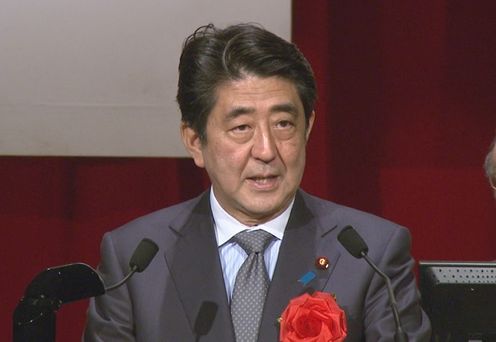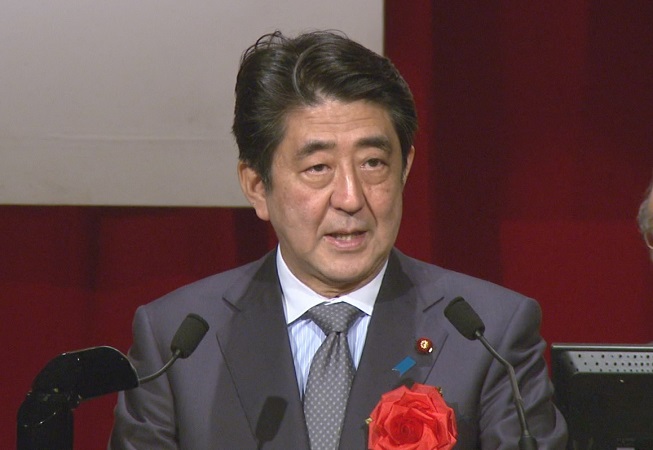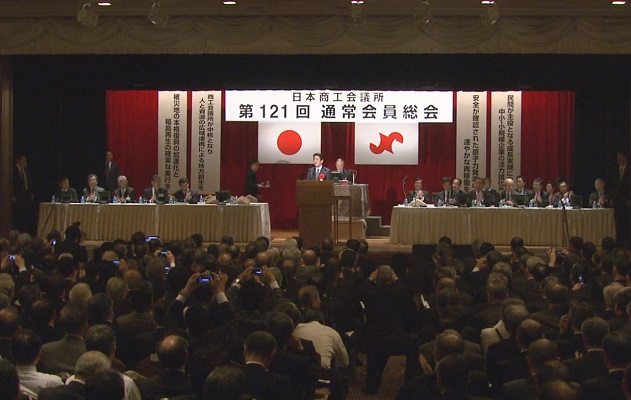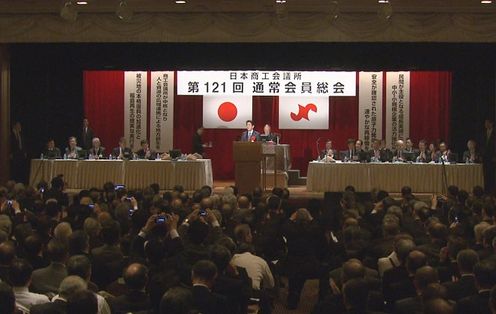Home > News > The Prime Minister in Action > March 2015 > The General Meeting of the Japan Chamber of Commerce and Industry
The Prime Minister in Action
The General Meeting of the Japan Chamber of Commerce and Industry
March 19, 2015
[Provisional Translation]
Prime Minister Shinzo Abe attended the 121st Annual General Meeting of the Japan Chamber of Commerce and Industry held in Tokyo.
The Prime Minister said in his address,
“Thank you very much for inviting me to the 121st Annual General Meeting today.
It has been four years since the Great East Japan Earthquake. Though it has been one step at a time, the reconstruction process has undoubtedly moved onto a new stage. I would like to once again thank everyone at the Chamber of Commerce and Industry for all of your support.
It is not easy to restore trade routes once you have lost them. The first step towards achieving recovery and new development this spring will lead to a breakthrough in resolving this challenge. Based on the requests received from people who are struggling to piece together their production facilities, we have launched a project that provides them with idle facilities in Japan. This project has greatly helped businesses in the affected areas get back on their feet again. This year will also mark the fifth year of the Tohoku Rokkon Festival, a reconstruction event held to attract tourists from Japan and overseas who have stayed away from the area. These efforts will help form new regional ties and transform the affected areas into lively communities again. Such carefully-tailored support programs are possible precisely because the Chamber of Commerce and Industry is deeply rooted in the region. I would like to thank you for your efforts thus far, while also asking for your continued strong support. The Abe Cabinet is fully committed to supporting the efforts to reconstruct the livelihoods of those working in the affected areas and to provide psychological reconstruction support, while sharing the mindset that all Cabinet members are Ministers for Reconstruction and continuing to stand in solidarity with the people in the affected areas. Let us see to it that reconstruction is achieved in the affected areas with all of Japan working as one.
More than two years have passed since I said ‘to take Japan back.’ Today, the three arrows of Abenomics are steadily delivering results. The effective ratio of job offers to applicants is at its highest level in 22 years. Since the inauguration of the Abe administration, the diffusion index for small- and medium-sized enterprises’ (SMEs) business conditions has improved by 14%, and for cash position it has improved by 7%. The number of bankruptcies last year was 20% lower compared to the levels before the change in government and was under 10,000 per year for the first time in 24 years. That said, I am very aware that the wave of economic recovery has not yet reached SMEs throughout Japan. I often hear earnest requests such as ‘Mr. Abe, we cannot pass on the raw material and energy costs to prices due to rising costs.’ To respond to these appeals, since the end of last year, we have been implementing a package to deal with the rising raw material and energy costs. We have requested that about 200,000 companies reflect the increased portion of raw material costs in transaction prices appropriately. Industry-specific guidelines on subcontracting will be revised by the end of this month. Concentrated onsite audits of 500 major corporations will be conducted by the end of this month. All chambers of commerce and industry in Japan have been asked to offer consultation services for cost increases in order to dispel the concerns of businesses in any way they can. Furthermore, we will take all possible measures to offer financial support. By making requests to public financial institutions, over the past four months, repayment periods for about 200,000 companies have been extended. We will also launch new low interest loans for businesses facing financing difficulties and for businesses promoting energy conservation investment.
At the Government-Labor-Management Meeting that was held immediately after the general election late last year, which was also attended by Chairman Mimura, an agreement was reached regarding the implementation of price increases, supports, and cooperation for subcontracting companies. Following the agreement, we are beginning to see improvements in transaction terms. For example, recently, Toyota Motor Corporation has taken steps to fulfil its pledge to pass price increases onto business partners, and will not request business partners to lower their prices. We are also seeing some subsidiary companies follow suit. The Government will hold another Government-Labor-Management Meeting in the near future and fully follow up on these developments. To expand virtuous economic cycles, it is essential that SMEs have healthy business performances. The Abe administration has restored the manufacturing subsidies which were abolished by the review of government programs during the rule of the Democratic Party of Japan. We have revamped the subsidies by including unpaid overtime work for eligibility. So far, about 25,000 companies have benefited from the subsidies. In addition, we intend to support about 10,000 companies using the supplementary budget that was passed in early February. The Government will continue to support SMEs that realize innovative and high value-added businesses. The key to realizing virtuous cycles of the economy is none other than wage increases. Last year, about two-thirds of SMEs implemented wage increases. Looking at the responses at yesterday’s spring wage offensive, I see that this year we are off to a better start than last year. Whether or not the winds of economic recovery will be felt throughout Japan depends on whether SMEs press ahead with bold wage increases. As I say this, I can see some of you grimacing. Everyone, the environment is being set for wage increases. I urge all chambers of commerce and industry throughout Japan to make proactive efforts to increase wages and expand the virtuous cycles of the economy.
We will eliminate the practice of placing undue emphasis on personal guarantees, which dictate that if you fail once, you lose everything, thus creating an environment in which it is easy to take on new challenges. In February last year, we created a new set of guidelines whereby it is possible to receive financing even without personal guarantees, provided that personal and company assets are separated and carefully managed. The Japan Finance Corporation and the Shoko Chukin Bank alone have extended financing without personal guarantees in more than 50,000 cases over the past year. It is truly the case that the best lessons are learned from the front lines. Regional areas will play the leading role in growth. However, the regions are faced with the pressing issues of rapid population decline and the aging of the population. We must implement measures to maintain the vitality of Japanese society, utilizing all possible policies in a focused and seamless manner. Above all, what is critical is that we make use of regional communities’ own ideas, and bring about a transformation.
The fundamental aspect of the Abe administration’s regional vitalization is to fully support the passionate creativity of the regions. Based on a review of policies to date, we will not apply uniform frameworks that have been predetermined by the Government, and will eliminate vertical segmentation to promote regional vitality in an integrated manner. As part of our recent economic measures, we created product coupons with premiums, merchandise certificates for local specialties, and travel coupons, which allow local governments to freely plan their own undertakings in a manner suited to actual local circumstances. For example, Ama Town in the Oki Islands issued merchandise certificates tied to local currency to promote consumption there. I believe that if all local governments make the most of their creativity we will see maximum effects. We will also formulate a comprehensive regional strategy based on the unrestricted ideas of the regions. We will ask the regions to propose their own unique initiatives for regional vitalization and the Government will provide our full support for these proposals. The regions and the Government will work as one to promote regional vitalization. The role of local chambers of commerce and industry, who have roots in regional communities and regional economies, is extremely important for ensuring the effectiveness of these initiatives. Under the strong leadership of Chairman Mimura, and with all regions competing with each other, I ask that you devote your efforts to accelerating regional vitalization and the revitalization of the Japanese economy.
In closing, I would like to conclude my remarks by expressing my hopes for the further development of the Japan Chamber of Commerce and Industry and local chambers of commerce and industry across the country, the continued good health of everyone in attendance today, and ever higher wages for those working for SMEs. Thank you very much.”




